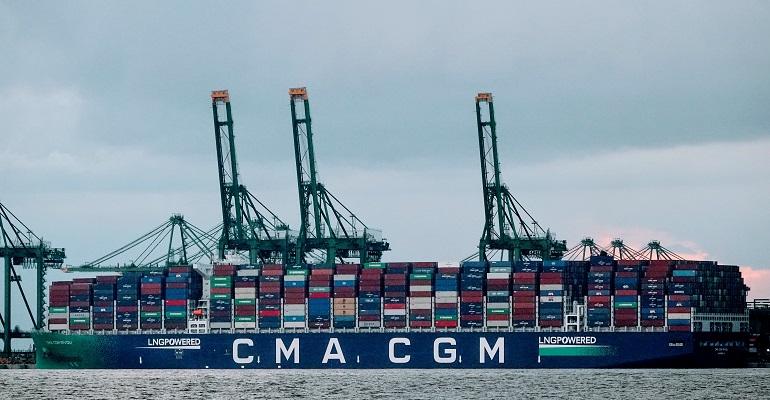The Drewry World Container Index (WCI) declined by 0.2% for the week ended 30 September to $10,360.87 per feu, remaining some 291.8% higher than a year earlier. The marginal drop in average, follows a flat index week earlier, which marked a stabilisation after 22 weeks of consecutive increases.
The overall week-on-week decrease was driven by the transpacific trade with Shanghai – Los Angeles down 2% at $12,172 per feu, which remains up 198% year-on-year. The backhaul LA – Shanghai saw a 1% decrease last week to $1,383 per feu.
Spot rates on Asia – North Europe rose though with Shanghai – Rotterdam up 1% at $14,558 per feu, with rates up 535% year-on-year.
“Drewry expects rates to remain steady in the coming week,” the analyst said.
The stabilising of spot rates coincided with CMA CGM’s announcement that it would be freezing spot increases until 1 February next year.
The change in approach was noted by Xenata CEO Patrik Berglund. “However, with rates already so high there’ll no doubt be many shippers viewing this as ‘crumbs from the rich man’s table’… and let’s see if any freezes do take hold within the broader carrier community,” he commented.
While container spot rates may finally be showing some stability Xenata said the impact on long-term rates continues to be felt with another 3.2% rise in September taking year to date increases to 91.5%.
Xenata little evidence that the fundamentals are weakening and expects rates to remain strong.
“This year has seen a unique convergence of Covid-19 disruption, port congestion, strong demand and maxed-out capacity, and that has stoked the flames of record-breaking rates,” explained Berglund. “The global supply chain is under immense pressure and desperate shippers have no choice but to pay up to secure deliveries, or at least try to, ahead of key trading periods such as Christmas. It’s a crazy market out there.”
Xenata noted that with market strongly in their favour lines were looking to lock in customers in long-term bookings with some even offering multi-year deals with guaranteed shipments.
“Shippers are treading carefully in this regard, but there is some appetite for longer-term commitment – raising the question of whether both parties might look beyond the traditional tender?” Berglund said.
It was noted that long-term contracts already account for 60% of Maersk’s bookings.
Copyright © 2024. All rights reserved. Seatrade, a trading name of Informa Markets (UK) Limited.
Add Seatrade Maritime News to your Google News feed.  |

